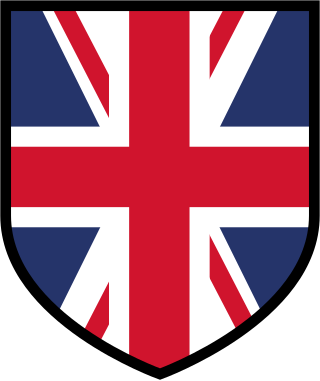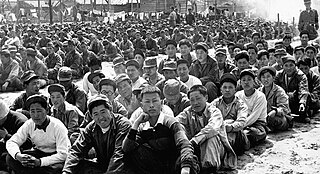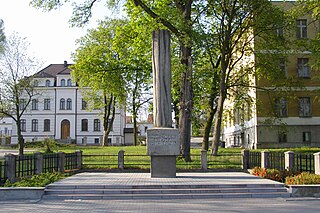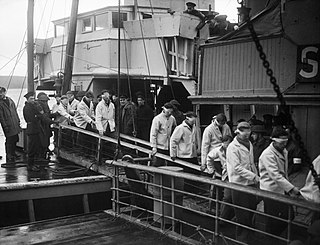Related Research Articles

A prisoner of war (POW) is a person who is held captive by a belligerent power during or immediately after an armed conflict. The earliest recorded usage of the phrase "prisoner of war" dates back to 1610.

The British Free Corps was a unit of the Waffen-SS of Nazi Germany during World War II, made up of British and Dominion prisoners of war who had been recruited by Germany. The unit was originally known as the Legion of St George. Research by British historian Adrian Weale has identified 54 men who belonged to this unit at one time or another, some for only a few days. At no time did it reach more than 27 men in strength.

During the American Revolutionary War (1775–1783), management and treatment of prisoners of war (POWs) were very different from the standards of modern warfare. Modern standards, as outlined in the Geneva Conventions of later centuries, assume that captives will be held and cared for by their captors. One primary difference in the 18th century was that care and supplies for captives were expected to be provided by their own combatants or private resources.

The Czechoslovak Legion were volunteer armed forces comprised predominantly of Czechs and Slovaks fighting on the side of the Entente powers during World War I and the White Army during the Russian Civil War until November 1919. Their goal was to win the support of the Allied Powers for the independence of Lands of the Bohemian Crown from the Austrian Empire and of Slovak territories from the Kingdom of Hungary, which were then part of the Austro-Hungarian Empire. With the help of émigré intellectuals and politicians such as the Czech Tomáš Garrigue Masaryk and the Slovak Milan Rastislav Štefánik, they grew into a force over 100,000 strong.

Missing in action (MIA) is a casualty classification assigned to combatants, military chaplains, combat medics, and prisoners of war who are reported missing during wartime or ceasefire. They may have been killed, wounded, captured, executed, or deserted. If deceased, neither their remains nor grave have been positively identified. Becoming MIA has been an occupational risk for as long as there has been warfare.

Foyle's War is a British detective drama television series set during and shortly after the Second World War, created by Midsomer Murders screenwriter and author Anthony Horowitz and commissioned by ITV after the long-running series Inspector Morse ended in 2000. It began broadcasting on ITV in October 2002. ITV director of programmes Simon Shaps cancelled Foyle's War in 2007, but Peter Fincham revived the programme after good ratings for 2008's fifth series. The final episode was broadcast on 18 January 2015, after eight series.

A prisoner-of-war camp is a site for the containment of enemy fighters captured as prisoners of war by a belligerent power in time of war.
The repatriation of the Cossacks or betrayal of the Cossacks occurred when Cossacks, ethnic Russians and Ukrainians who were opposed to the Soviet Union and fought for Nazi Germany, were handed over by British and American forces to the Soviet Union after the conclusion of World War II. Towards the end of the European theatre of World War II, many Cossacks forces with civilians in tow retreated to Western Europe. Their goal was to avoid capture and imprisonment by the Red Army for treason, and hoped for a better outcome by surrendering to the Western Allies, such as to the British and Americans. However, after being taken prisoner by the Allies, they were packed into small trains. Unbeknownst to them, they were sent east to Soviet territories. Many men, women and children were subsequently sent to the Gulag prison camps, where some were brutally worked to death. The repatriations were agreed upon at the Yalta Conference; Soviet leader Joseph Stalin claimed that the prisoners were Soviet citizens as of 1939, although there were many of them that had left the country before or soon after the end of the Russian Civil War or had been born abroad, hence never holding Soviet citizenship.

Operation Magic Carpet was the post-World War II operation by the U.S. War Shipping Administration (WSA) to repatriate over eight million American military personnel from the European, Pacific, and Asian theaters. Hundreds of Liberty ships, Victory ships, and troop transports began repatriating soldiers from Europe to the United States in June 1945. Beginning in October 1945, over 370 United States Navy ships were used for repatriation duties in the Pacific. Warships, such as aircraft carriers, battleships, hospital ships, and large numbers of assault transports were used. The European phase of Operation Magic Carpet concluded in February 1946 while the Pacific phase continued until September 1946.

Oflag 64 was a World War II German prisoner-of-war camp for officers located at Szubin a few miles south of Bydgoszcz, in Pomorze, Poland, which at that time was occupied by Nazi Germany. It was probably the only German POW camp set up exclusively for U.S. Army ground component officers. At most other camps there were several nationalities, although they were usually separated into national compounds.
Series 1 of the ITV programme Foyle's War was first broadcast in 2002; comprising four episodes, it is set in Spring/Summer 1940.
Series 2 of the ITV programme Foyle's War was first aired in 2003; comprising four episodes, it is set in autumn 1940. Series 2 was broadcast in the United States on PBS on Mystery!, on 18 and 25 July, and 1 and 8 August 2004, as Foyle's War II, and on Netflix as of April 2014.
Series 3 of the ITV programme Foyle's War was first aired in 2004; comprising four episodes, it is set in early 1941. Series 3 was broadcast in the United States on PBS on Mystery!, on 11, 18, and 25 September, and 2 October 2005 as Foyle's War III, and on Netflix as of April 2014.
Series 4 of the ITV programme Foyle's War was first aired in 2006. It is the only series to be divided into two parts, one comprising two episodes screened in 2006, and the other comprising two from 2007. It was the last series of four episodes; later series had only three. It is set in the period from March 1942 to March 1943.
Series 5 of the ITV programme Foyle's War was first aired in 2008; comprising three episodes, it is set in the period from April 1944 to May 1945.

Victims of Yalta or The Secret Betrayal is a 1977 book by Nikolai Tolstoy that chronicles the fate of Soviet citizens who had been under German control during World War II and at its end fallen into the hands of the Western Allies. According to the secret Moscow agreement from 1944 that was confirmed at the 1945 Yalta conference, all citizens of the Soviet Union were to be repatriated without choice—a death sentence for many by execution or extermination through labour.

During World War II, it was estimated that between 35,000 and 50,000 members of the Imperial Japanese Armed Forces surrendered to Allied servicemembers prior to the end of World War II in Asia in August 1945. Also, Soviet troops seized and imprisoned more than half a million Japanese troops and civilians in China and other places. The number of Japanese soldiers, sailors, marines, and airmen who surrendered was limited by the Japanese military indoctrinating its personnel to fight to the death, Allied combat personnel often being unwilling to take prisoners, and many Japanese soldiers believing that those who surrendered would be killed by their captors.
Series 7 of the ITV programme Foyle's War first aired in 2013, beginning Sunday 24 March; comprising three episodes, it is set in the period from August–September 1946.
Series 8 of the ITV programme Foyle's War, comprising three episodes, aired in January 2015 on ITV. Though most episodes were broadcast at 8 pm on ITV, the final one was transmitted at 9 pm.

Large numbers of German prisoners of war were held in Britain between the outbreak of the Second World War in September 1939 and late 1948. Their numbers reached a peak of around 400,000 in 1946, and then began to fall when repatriation began. The experiences of these prisoners differed in certain important respects from those of captured German servicemen held by other nations. The treatment of the captives, though strict, was generally humane, and fewer prisoners died in British captivity than in other countries. The British government also introduced a programme of re-education, which was intended to demonstrate to the POWs the evils of the Nazi regime, while promoting the advantages of democracy. Some 25,000 German prisoners remained in the United Kingdom voluntarily after being released from prisoner of war status.
References
- ↑ "Foyle's War". Icon Movies. Archived from the original on 9 January 2010. Retrieved 1 May 2010.
- ↑ Fitzgerald, James (15 April 2017). "The West Indies Ships That Arrived Before The Windrush". The Londonist. Retrieved 11 October 2018.
- ↑ "Foyle's War Series VI". PBS. Archived from the original on 9 February 2015.
- ↑ Thomas, Chet (2 April 2014). "More British TV Shows on Netflix: 'Foyle's War'". Netflix TV Shows Review. Archived from the original on 8 November 2014.